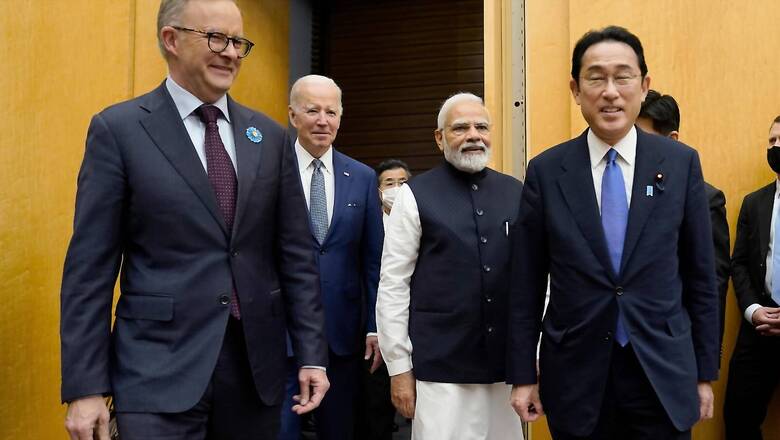
views
As differences persist between the US and India on their response to the situation in Ukraine, President Joe Biden has sought to draw parallels between the war in Europe and the situation in the Indo-Pacific region vis-à-vis China’s expansionist agenda.
Speaking at a meeting of the Quad group of countries in Tokyo, Biden said: “This is more than just a European issue. It’s a global issue.”
Stressing that Washington would stand with its “close domestic partners” to push for a free and open Indo-Pacific, he said: “Russia’s assault of Ukraine only heightens the importance of those goals of fundamental principles of international order, territorial integrity and sovereignty.”
While the Quad largely agrees that the situation in Ukraine is a serious threat to the international order, the grouping has remained unclear on how to directly address the matter in a joint statement.
India has been urging an end to hostilities in Ukraine and peaceful solution through talks, but its position has differed from the other Quad partners on US-led sanctions against Russia.
India has developed close ties with Washington in recent years and is a vital part of the Quad grouping aimed at pushing back against China. But it has a long-standing relationship with Moscow, which remains a major supplier of its defence equipment and oil supplies. India has abstained in UN Security Council votes on the issue, while continuing to raise concerns over the civilian casualties in Ukraine.
Keen on India’s support, Washington has been trying to wean New Delhi off Russian-supplied military equipment, mulling providing defence aid and other support to India to accelerate that transition.
On Monday, India announced that the United States is considering “investment support” of $4 billion for India on top of billions of dollars extended earlier. The two sides also signed an agreement for Covid-19 vaccine manufacturing, healthcare, renewable energy, financial inclusion and infrastructure.
India has also joined the United States and 11 other countries in Washington-led economic talks called the Indo-Pacific Economic Framework for Prosperity (IPEF).
‘Dark Hour in Shared History’
On Tuesday, Joe Biden opened his last day in Asia by holding talks with other Quad leaders – Indian Prime Minister Narendra Modi, Japanese premier Fumio Kishida whose nation is hosting the summit and Australia’s new PM Anthony Albanese.
After a light-hearted remark expressing admiration for Albanese joining the summit in Tokyo barely 24 hours after taking charge as the Australian PM, Biden turned his attention to more serious matters.
In a statement, he said the Quad leaders were “navigating through a dark hour in our shared history” because of Russia’s war on Ukraine.
Kishida, too, took note of the war in Ukraine and added: “We cannot let the same thing happen in the Indo-Pacific region.”
PM Modi did not address the issue in his public remarks as the summit got under way.
After the four-way gathering of the security group, Biden and Modi are scheduled to hold separate talks. The two leaders had spoken about the Russian invasion during a virtual Quad leaders’ meeting in March, and last month they had a short video conversation when Secretary of State Antony Blinken and Defense Secretary Lloyd Austin met with their Indian counterparts in Washington.
Read all the Latest India News here
















Comments
0 comment